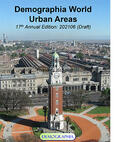God has a special providence for fools, drunkards, and the United States of America.
~Otto von Bismarck read more »
China
America the Indispensable
- Login to post comments
Focusing on World Megacities: Demographia World Urban Areas, 2021
The 2021 edition of Demographia World Urban Areas includes current population estimates for the 985 identified built-up urban areas (Note 1 describes the background and methodology) with at least 500,000 population.This is a smaller number than last year, due to a methodology that rendered somewhat lower populations for some urban areas. read more »
- Login to post comments
International Traffic Congestion Extinguished by Pandemic and Remote Work
The 2020 TomTom Traffic Index reflects a huge drop in worldwide urban traffic congestion levels. Congestion levels (rated by the percentage of additional time required for auto travel during “rush hour”) dropped in 387 urban areas while increasing in only 13. read more »
China 2020 Census: Provincial Level Data and Context
China added 70 million residents between 2010 and 2020, according to the seventh national population census, taken on November 1, 2020. This increase surprised some, such as the Financial Times, which had predicted a loss less than three weeks before the results were announced. read more »
- Login to post comments
Winners and Losers: The Global Economy After COVID
The COVID-19 pandemic has transformed the world economy in ways that will be debated by pundits and future historians for decades to come. Yet, as hard as it is to predict a disrupted future accurately, the pandemic (not to mention its probable successors) looks likely to produce clear economic winners and losers. read more »
Who Will Control the 21st Century? Whoever Controls Space
It's impossible to predict the future. But one thing you can be sure of: few things will be more important to the lives of our children than who wins the emerging, epoch-defining struggle for control of space.
This is a battle just beginning over who will control the communication satellites so central to our economy, as well as the vast resources of other planets. But ultimately, the new space battle represents a war over opportunities for colonization, for an increasingly resource-stretched and crowded earth. read more »
- Login to post comments
Biden’s Actions Are Encouraging Supply Chain Dependencies From Foreign Sources
Despite President Biden’s February 24th vocal concerns about America’s growing dependence on unreliable foreign sources for the supply chain of materials and products to support electric cars, pharmaceuticals, hospital supplies to address the COVID-19 pandemic, and military hardware, his actions are directly opposite of his vocal concerns, as they are encouraging national security concerns. read more »
- Login to post comments
China Freight Volumes Hold Steady in Pandemic Year
China’s National Bureau of Statistics has just published freight transportation statistics for 2020. It tells much about China’s seemingly inexorable rise and its ties to the tangible economy. While different from most in the West, its stolidity and trajectory are fairly well-established. read more »
- Login to post comments
Those millions of New 'Green' Jobs are Going to China and India
When U.S. Secretary of State John Kerry recently urged workers upset by the Biden administration’s decision to scuttle the Keystone XL pipeline to “learn to make solar panels”, he was oblivious to the fact that China and India dominate the solar panel manufacturing market. read more »
- Login to post comments
China Rediscovers Rural Life (Cue Applause)
Another period of singing the virtues of Chinese Communist Party (CCP) direction seems upon us, at least when it comes to steering an economy. Just as after the Great Recession of 2008-9, China’s rebound from the Coronavirus Covid-19 has led the world. Of course, the official statistics always bear scrutiny, and public debt levels probably lend a false note to stimulus measures. But a 4.9% growth rate in third-quarter GDP looked great. read more »
- Login to post comments





















